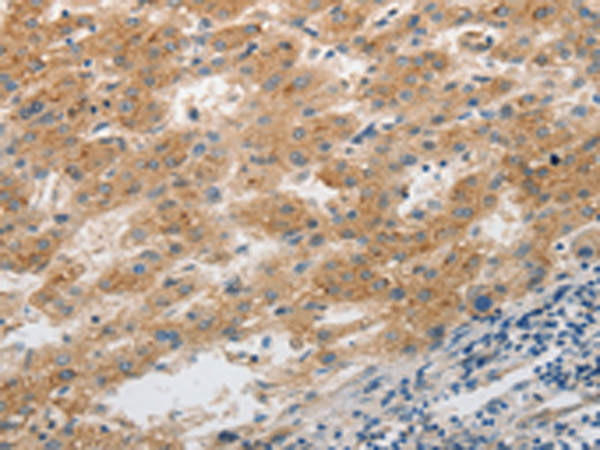

| WB | 咨询技术 | Human,Mouse,Rat |
| IF | 咨询技术 | Human,Mouse,Rat |
| IHC | 1/25-1/100 | Human,Mouse,Rat |
| ICC | 技术咨询 | Human,Mouse,Rat |
| FCM | 咨询技术 | Human,Mouse,Rat |
| Elisa | 1/1000-1/5000 | Human,Mouse,Rat |
| Aliases | EAAT2, GLT-1 |
| Host/Isotype | Rabbit IgG |
| Antibody Type | Primary antibody |
| Storage | Store at 4°C short term. Aliquot and store at -20°C long term. Avoid freeze/thaw cycles. |
| Species Reactivity | Human, Mouse, Rat |
| Immunogen | Synthetic peptide of human SLC1A2 |
| Formulation | Purified antibody in PBS with 0.05% sodium azide and 50% glycerol. |
+ +
以下是关于SLC1A2抗体的3篇参考文献及其简要摘要:
---
1. **文献名称**:*Selective loss of glial glutamate transporter EAAT2 in amyotrophic lateral sclerosis*
**作者**:Rothstein JD, et al.
**摘要**:该研究通过使用SLC1A2(EAAT2)特异性抗体,发现肌萎缩侧索硬化症(ALS)患者的运动皮层和脊髓中EAAT2蛋白水平显著降低,提示谷氨酸转运障碍可能与ALS的神经退行性病变相关。
---
2. **文献名称**:*Glutamate transporter EAAT2 expression is up-regulated in astrocytes during postnatal development*
**作者**:Sheldon AL, Robinson MB.
**摘要**:通过免疫组化和Western blot分析,利用SLC1A2抗体证明EAAT2在大鼠脑内星形胶质细胞中的表达随发育阶段逐渐增加,提示其在突触谷氨酸清除中的关键作用。
---
3. **文献名称**:*Altered expression of the glutamate transporter EAAT2 in Huntington's disease*
**作者**:Scott HL, et al.
**摘要**:研究采用SLC1A2抗体检测亨廷顿病模型小鼠脑组织,发现纹状体和皮层中EAAT2蛋白表达显著减少,可能与疾病中谷氨酸毒性导致的神经元损伤有关。
---
这些文献均通过SLC1A2抗体的实验手段,探讨了该蛋白在神经疾病中的表达变化及其病理意义。如需具体文献年份或期刊,建议通过PubMed/Google Scholar检索标题进一步确认。
The SLC1A2 antibody targets the solute carrier family 1 member 2 (SLC1A2), a protein encoded by the SLC1A2 gene, also known as excitatory amino acid transporter 2 (EAAT2). This transmembrane protein is predominantly expressed in astrocytes within the central nervous system (CNS) and plays a critical role in regulating extracellular glutamate levels. By transporting glutamate—a major excitatory neurotransmitter—into glial cells, SLC1A2 prevents glutamate-induced neuronal excitotoxicity, maintaining synaptic plasticity and neural homeostasis. Dysregulation of SLC1A2 is implicated in neurodegenerative disorders (e.g., amyotrophic lateral sclerosis, Alzheimer’s disease), epilepsy, and psychiatric conditions.
The SLC1A2 antibody is widely used in neuroscience research to study protein expression, localization, and function in both healthy and diseased tissues. Applications include immunohistochemistry, Western blotting, and flow cytometry. Researchers rely on validated antibodies to ensure specificity, as cross-reactivity with other glutamate transporters (e.g., EAAT1 or EAAT3) may occur. Recent studies also explore SLC1A2’s role in neuroinflammation and its potential as a therapeutic target. However, variability in antibody performance across experimental conditions underscores the need for rigorous validation, including knockout controls, to confirm reliability in diverse models, from cell lines to post-mortem human brain samples.
×